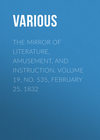Loe raamatut: «New York Times Current History: The European War, Vol 1, No. 1», lehekülg 13
What the German Conscript Thinks
By Arnold Bennett
Copyright, 1914, by The New York Times Company
Some hold that this is a war of Prussian militarism, and not a war of the German people. This view has the merits of kindliness and convenience. Others warn us not to be misled by such sentimentalists, and assert that the heart of the German people is in the war. The point is of importance to us, because the work of the conscript in the field must be influenced by his private feelings. Notwithstanding all drill and sergeantry, the German Army remains a collection of human beings—and human beings more learned, if not better educated, than our own race! It is not a mere fighting machine, despite the efforts of its leaders to make it into one.
Among those who assert that the heart of the German people is in the war are impartial and experienced observers who have carefully studied Germany for many years. For myself, I give little value to their evidence. To come at the truth by observation about a foreign country is immensely, overpoweringly difficult. I am a professional observer: I have lived in Paris and in the French provinces for nine years; I am fairly familiar with French literature and very familiar with the French language—and I honestly would not trust myself to write even a shilling handbook about French character and life. Nearly all newspapers are conservative; nearly all foreign correspondents adopt the official or conventional point of view; and the pictures of foreign life which get into the press are, as a rule—shall I say incomplete?
Even when the honest observer says, "These things I saw with my own eyes and will vouch for," I am not convinced that he saw enough. An intelligent foreigner with first-class introductions might go through England and see with his own eyes that England was longing for protection, the death of home rule, and the repeal of the Insurance act. The unfortunate Prince Lichnowsky, after an exhaustive inquiry and access to the most secret sources of exclusive information telegraphed to the Kaiser less than a month ago that civil war was an immediate certainty throughout Ireland. Astounding fatuity? Not at all. English observers of England have made, and constantly do make, mistakes equally prodigious. See Hansard every month. So that when I read demonstrations of the thesis that the heart of the German people is in the war, I am not greatly affected by them.
German Heart Is In the War.
Still, I do myself believe that the heart of the German people is in the war, and that that heart is governed by two motives—the motive of self-defense against Russia and the motive of overbearing self-aggrandizement. I do not base my opinion on phenomena which I have observed. Beyond an automobile journey through Schleswig-Holstein, which was formidably tedious, and a yacht journey through the Kiel Canal and Kiel Bay, which was somewhat impressive, I have never traveled in Germany at all. I base my opinion on general principles. In a highly educated and civilized country such as Germany (the word "civilized" must soon take on a new significance!) it is impossible that an autocracy, even a military autocracy, could exist unrooted in the people. "Prussian militarism" may annoy many Germans, but it pleases more than it annoys, and there can be few Germans who are not flattered by it. That the lower classes have an even more tremendous grievance against the upper classes in Germany than in England or France is a certitude. But the existence and power of the army are their reward, their sole reward, for all that they have suffered in hardship and humiliation at the hands of the autocracy. It is the autocracy's bribe and sweetmeat to them.
The Germans are a great nation; they have admirable qualities, but they have also defects, and among their defects is a clumsy arrogance, which may be noticed in any international hotel frequented by Germans. It is a racial defect, and to try to limit it to the military autocracy is absurd. An educated and civilized nation has roughly the Government that it wants and deserves. And it has in the end ways of imposing itself on its apparent rulers that are more effective than the ballot box or the barricade, and just as sure. No election was needed to prove to the Italian Government that Italy did not want to fight for the Triple Alliance, and would not fight for it. The fact was known; it was immanent in the air, beyond all arguments and persuasions. Italy breathed a negative, and war was not. So in Germany the mass of Germans have for years breathed war, and war is. The war may be autocratic, dynastic, what you will; but it is also national, and it symbolizes the national defect.
How About the Leaders?
Does the German conscript believe in the efficacy of his leaders? I mean when he is lying awake and fatigued at night, not when he is shouting "Hoch!" or watching the demeanor of women in front of him. Does no doubt ever lancinate him? Again I would answer the question from general principles and not from observation. The German conscript must know what everybody knows—that in almost every bully there is a coward. And he must know that he is led by bullies. He learned that in the barrack yard. An enormous number of conscripts must also know that there is something seriously wrong with a system that for the sake of its own existence has killed freedom of the press. And the million little things that are wrong in the system he also knows out of his own daily life as a conscript. Further, he must be aware that there is a dearth of really great men in his system. In the past there were in Germany men great enough to mesmerize Europe—Bismarck and von Moltke. There is none today that appeals to the popular imagination as Kitchener does in England or Joffre in France. Alone, in Germany, the Kaiser has been able to achieve a Continental renown. The Kaiser has good qualities. But twenty-four years ago he committed an act of folly and (one may say) "bad form" which nothing but results could justify, and which results have not justified. Whatever his good qualities may be it is an absolute certainty that common sense, foresight, and mental balance are not among them. The conscript feels that, if he does not state it clearly to himself. And as for the military organization of which the Kaiser is the figurehead, it has shown for many years past precisely those signs which history teaches us are signs of decay. It has not withstood the fearful ordeal of success. Just lately, if not earlier, the conscript must have felt that, too.
What is the conclusion? Take the average conscript, the member of the lower middle class. He is accustomed to think politically, because at least fifty out of every hundred of him are professed Socialists with a definite and bitter political programme against certain manifestations of the autocracy. (It is calculated that two-fifths of the entire army is Socialist.) He may not argue very closely while in the act of war; indeed, he could not. But enormous experience is accumulated in his subconsciousness—experience of bullying and cowardice, of humiliation, of injustice, of lying, and of his own most secret shortcomings—for he, too, is somewhat of the bully, out for self-aggrandisement as well as for self-defense, and his conscience privately tells him so. The organization is still colossal, magnificent, terrific. In the general fever of activity he persuades himself that nothing can withstand the organization; but at the height of some hand-to-hand crisis, when one-hundredth of a dogged grain of obstinacy will turn the scale, he may remember an insult from an incompetent officer, or the protectionism at home which puts meat beyond his purse in order to enrich the landowner, or even the quite penal legislation of the autocracy against the co-operative societies of the poor, and the memory (in spite of him) may decide a battle. Men think of odd matters in a battle, and it is a scientific certainty that, at the supreme pinch, the subconscious must react.
Felix Adler's Comment
From The Standard, Oct. 14, 1914
Apropos of a recent article by Mr. Arnold Bennett, wherein he speaks of the resentment which the German soldiers—two-fifths of them Socialists—must feel against the bullying discipline to which they have been subjected, the following reflections are jotted down. The reader who is interested in pursuing the subject further may profitably consult a book entitled "Imperial Germany," by Prince von Bülow, which contains some penetrating observations on the workings of the German mind, as well as the chapter on Germany in Alfred Fouillée's notable work, "Esquisse Psychologique des Peuples Européens."
The precision which characterizes the operations of the German military machine is due to the German notion of discipline. Discipline in Germany is based on the peculiar place assigned to the expert. Military experts exercise in their branch an authority different in degree but not in kind from that belonging to experts in other departments—strategy, tactics, improvements of armament, methods of mobilization. The inexpert soldier submits to the military expert as a person about to undergo a necessary operation would submit to a surgeon. It is a mistake to suppose that the Germans, a highly intelligent and educated people, are being cowed into submission by brutal non-commissioned officers. Brutality, when it occurs, is looked upon as exceptional and incidental to a system on the whole approved. The Germans would never tolerate the severe discipline to which they are subjected did they not willingly submit to it. They regard a highly efficient army as necessary to the safety of the Fatherland, and they are willing to leave the responsibility for the means of securing efficiency to the experts. During the Franco-German war, when a student in the University of Berlin, I talked with some of the brightest of the younger men about their military obligations, and I found that they took precisely the view just stated. The Pomeranian peasant may submit to military dictation in a dull, half-instinctive fashion. The flower and élite of German intelligence submit to it no less—from conviction.
How shall we account for the unique predominance of the expert in German life? The explanation would seem to lie in the phrase invented by a brilliant writer of the last century, "Deutschland ist Hamlet" (Germany is Hamlet). The Germans are a resolute people—not at all, as has been erroneously supposed, a nation of dreamers—just as Hamlet, according to recent criticism, was essentially of a resolute character. In the days of the Hansa and of the Hohenstaufen the Germans cut a great figure in oversea commerce and in war. They were great doers of deeds. The Germans are intensely volitional, but also intensely intellectual. Hence the native hue of resolution has sometimes been sicklied o'er by too much thinking. The intellect of the German refuses to sanction action until the successive steps to be taken have been worked out with logical accuracy, and a scientific groove, so to speak, has been hollowed out along which action can proceed. As soon as this is accomplished, the flood of volitional impulse enters gladly into the channel prepared for it and moves on in it with irresistible force. Bismarck represents the active side, as the eminent philosophers of the German people represent the side of logical construction. The two sides must be taken together to understand German history and the tendencies prevailing in Germany today.
Underneath it all, of course, is German sentiment, but of this we need take no account in discussing German discipline, except in so far as love for the Fatherland enters in to sustain the patience of the people under the burden of their military establishment.
Discipline, or the subordination of the inexpert to the expert, likewise accounts for certain peculiarities of the German political parties. Prince von Bülow mentions three examples of supremely efficient organization—the Prussian Army, the Roman Catholic hierarchy, and the German Social Democracy. There are some 4,200 Socialist associations, subject to the orders of forty-two district associations, these in turn being ruled by the Central Committee. The working of the Social Democratic machine is almost flawless. The discipline, it is said, is iron.
Again, the conception of Government in Germany, unlike that which prevails in England, France, or America, is determined by the idea of expertness. The Government is the political expert par excellence. Its business is to study the interests of the State as a whole. In all matters of economic theory, of finance, of administration, of social reform, it invokes the advice of specialists. But it is itself the supreme political specialist. It stands high above all the political parties. It does not depend for its existence on majorities in Parliament. It seeks the co-operation of Parliament, but reserves to itself the right of initiative and leadership.
The object of the above remarks is to explain, not to justify, and in the face of much uninstructed criticism to point out the deep sources in the nature of the German people from which spring the influences that have molded their life. The chief objections to their system may be summarized in the statements, that it takes too little account of the value of the inexpert; that it tends to suppress latent spontaneity; and, especially in the sphere of government, that it ascribes to the expert a knowledge of the needs of the people such as no ruling class can ever possess. And it overlooks the highest aim of political life and activity, which is the education of the inexpert to such a point that they may become more or less expert in understanding and promoting the public weal.
When Peace Is Seriously Desired
By Arnold Bennett
From The Daily News of London
When peace is seriously desired in any quarter, the questions to be discussed by the plenipotentaries will fall into three groups:
1. Those which affect all Europe.
2. Those which chiefly affect Western Europe.
3. Those which chiefly affect Eastern Europe.
The first group is, of course, the most important, both practically and sentimentally. And the main question in it is the question of Belgium. The original cause of the war was Germany's deliberate and advertised bellicosity, and it might be thought that the first aim of peace would be by some means to extinguish that bellicosity. But relative values may change during the progress of a war, and the question of Belgium—which means the question of the sanction of international pledges—now stands higher in the general view than the question of disarmament. Germany has outraged the public law of Europe, and she has followed up her outrage with a series of the most cowardly and wanton crimes. She ought to pay, and she ought to apologize. Only by German payment and German apology can international law be vindicated. Germany should pay a sum large enough to do everything that money can do toward the re-establishment of Belgium's well-being. I have no competence to suggest the amount of the indemnity. A hundred million pounds does not appear to me too large.
Then the apology. It may be asked: Why an apology? Would not an apology be implied in the payment of an indemnity?
It is undeniable that Germany is now directed by hysteric stupidity wielding a bludgeon. Granted, if you will, that half the nation is at heart against the stupidity and the bludgeon. So much the worse for the half. Citizens who have not had the wit to get rid of the Prussian franchise law must accept all the consequences of their political ineffectiveness. The peacemakers will not be able to divide Germany into two halves.
For Potsdam a first-rate spectacular effect is needed, and that effect would best be produced by a German national apology carried by a diplomatic mission with ceremony to Brussels and published in all German official papers, and emphasized by a procession of Belgian troops down Unter den Linden. This visible abasement of German arms in front of the Socialists of Berlin would be an invaluable aid to the breaking of military tyranny in Prussia.
So much for the Belgium question and the sanction of international pledges. The other question affecting the whole of Europe is the hope of a universal limitation of armaments. But there is a particular question, touching France, which in practice would come before that. I mean Alsace-Lorraine. Unless Germany conquers Europe, Alsace-Lorraine should be restored to France. A profound national sentiment, to which all conceivable considerations of expediency or ultimate advantage are unimportant, demands imperatively the return of the plunder. And in the councils of the Allies, either alone or with German representatives, the attitude of French diplomacy would be: "Is it clear about Alsace-Lorraine? If so, we may proceed. If not, it's no use going any further."
Question of Armaments.
We now come to armaments. I have seen it suggested that the destruction of Essen, Wilhelmshaven, and Heligoland ought to be a condition of peace with Germany. Certainly the disappearance of these phenomena would be a gain to the world. So would the disappearance of Rosyth and Toulon. It seems to me, however, very improbable that their destruction or dismantling by international command would occur after hostilities have ceased, or could usefully so occur. If the French Army on its way to Berlin can treat the Krupp factory as the German Army on its way to Paris treated Rheims Cathedral, well and good! In fact, most excellent! And if the British Navy can somehow emasculate Wilhelmshaven and Heligoland I shall not complain that its behavior has been purely doctrinaire. But otherwise I see nothing practical in the Essen-Wilhelmshaven-Heligoland suggestion. Nor in the project for dethroning the Kaiser and sending him and his eldest son to settle their differences in St. Helena! The Kaiser—happily—is not a Napoleon, nor has he yet himself accomplished anything big enough or base enough to merit Napoleon's fate. Any dethroning that may enliven the gray monotony of the post-bellum era at Potsdam should and will be done by the German soldiers themselves. Even in international politics it is futile to try to meddle in other people's private affairs.
Disarmament in Germany can be achieved by the exercise of one principle, and one principle only. That principle is the principle of mutuality. A scheme in which every nation will proportionately share should be presented to Germany, and she should be respectfully but quite firmly asked to participate in it. There would be no sense in saying to Germany: "You must disarm." The magic words would be: "We are going to disarm, and so are you, whether you want to or not." As to the procedure of disarmament—whether it shall be slow or fast, whether it shall include destruction or be content with mere omission to renew, how the proportions shall be decided, who shall give the signal to begin—here are matters which I am without skill or desire to discuss. All I know about them is that they are horribly complicated, unprecedentedly difficult, and bursting with danger; and that they will strain the wisdom, patience, and ingenuity of the negotiators to the very utmost.
Three Vital Points.
Compared to disarmament, all remaining questions whatsoever affecting peace are simple and secondary. Indemnities for France or Russia, or both, a Polish Kingdom, a Balkan United States, the precise number of nations into which Austria-Hungary is to be shattered, the ownership of the east coast of the Adriatic, even the reparation of the infamy by which Denmark was robbed of Schleswig-Holstein—what are these but favorable ground for the art of compromise? The vital points, at any rate for us Westerners, are only three: Belgium, Alsace-Lorraine, and disarmament. * * * Stay, there is another. It is vital to Great Britain's reputation that she should accept nothing—neither indemnity, nor colonies; not a single pound, not a single square mile.
Many persons, I gather, find it hard to believe that Prussia will ever admit that she is beaten or consent to her own humiliation. Naturally her conduct will depend upon the degree to which she is beaten. She has admitted defeat and swallowed the leek before, though it is a long time ago. Meanwhile she has forgotten, and her opponents seem to have forgotten also, that though her name is Prussia she is subject to the limitations of the human race. Out of her prodigious score off little Denmark, her thrashing of Austria—a country which never wins a war—and her victory over France, there grew a legend that Prussia, and therefore Germany, was not as other nations. This legend is contrary to fact. Every nation must yield to force—here, indeed, is Germany's contribution to our common knowledge.
If in July, 1870, it had been prophesied that France would give up Alsace-Lorraine and pay two hundred millions to get rid of a foreign army of occupation, France would have protested that she would fight to the last man and to the last franc first. But nations don't do these things. If Germany won the present war and fulfilled her dream of establishing an army in this island, we should yield, and we should submit to her terms, we who have never been beaten save by our own colonies—that is a scientific certainty. And Germany's terms would not be amusing; in their terribleness they would outrun our poor Anglo-Saxon imagination. Similarly, if Germany is beaten, she will bow the head, and to precisely the extent to which she is walloped. We need not worry about that. Were she recalcitrant we need not even murmur in her ear: "What would you have extorted if you'd won?" A gesture of the still uplifted sword would suffice to convince her that facts are facts.
Assuming that the tide turns not again, the chances of a thorough, workmanlike common sense peace can only be imperiled by one thing—the deep desire of France and of Belgium for repose and recuperation. We in England do not know what war is. We have not lived in hell. Our plains have not been devastated, nor our women and children shot, nor our ears deafened by the boom of cannon, nor our cathedrals shelled, nor our land turned into a vast and bloody hospital; and we have not experienced the appalling terror and shame of the foe's absolute dominion in our streets and lanes. We have suffered; we shall suffer; but our suffering is nought and less than nought weighed against the suffering on the Continent. Why, in the midst of a war of unparalleled horror, we grumble if a train is late! We can talk calmly of fighting Germany to a stand-still, even if the job takes two years, and it behooves us to talk so, and to prepare for the task; and for myself I am convinced that we could make good the word. But France and Belgium will not use that tone, if Russia does. Once the German armies are across the frontiers, the instinctive pressure in favor of peace would be enormous, and considerations of the distant future, of the welfare of our descendants and the progress of mankind, would count little in the scale. In that moment, if it happily comes, our part and Russia's would be to sustain and encourage and salve the supreme victims of fate. A tremendous factor in our favor would be the exhaustion of Germany; and the measure of our power and of the fear we inspire is the furious intensity of Germany's anger against our inconvenient selves. Without us the war could not last beyond the end of this year, and the peace would be unsatisfactory.
And even with us, insisting on our own terms of reconciliation, I do not see how it can last over six months more on anything like the present scale, for the Kaiser, despite his kinship with Deity, can neither create men nor extract gold coins out of an empty hat. Military arguments, in Germany as elsewhere, hold good only for a certain period.




















